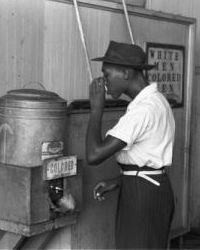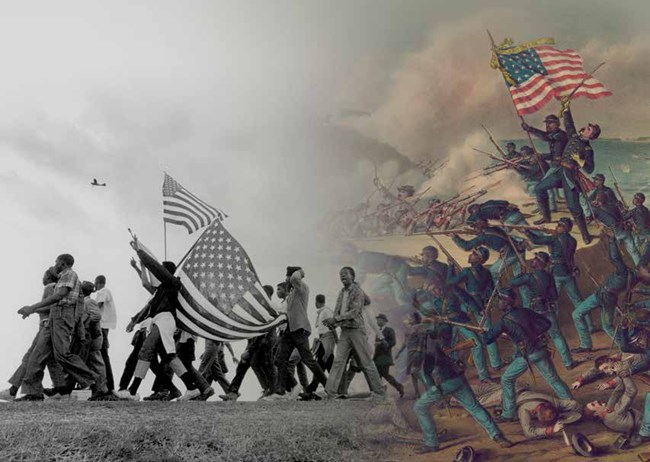
Though the Civil War began the movement to extend equality to African Americans, the promises of the 13th, 14th and 15th Amendments provide easier to accomplish in theory rather than in practice. The promising start towards racial equality soon faltered during the tensions of Reconstruction and laws were soon enacted across the country which enforced segregation of the races and the second-class status of African Americans.
Today, nearly 150 years since the end of the Civil War, people of all races, colors, creeds and beliefs continue the struggle to make America a nation where truly "all men are created equal."

Civil War to Civil Rights Commemoration - Summary Report
One hundred-fifty years ago, competing visions for the country and conflicting definitions of freedom led to a war that threatened the very existence of the United States. The nation was shattered into North and South by blue and gray. Fifty years ago, the streets of American cities ran red with blood again. From 2011-2015, the National Park Service joined the rest of the country in commemorating these major events that changed the nation forever–and continue to challenge it today. To honor these sacrifices, among many other special events, 40,000 people marched across the killing fields of Pickett’s Charge
at Gettysburg, and 50,000 marched across the Edmund Pettus Bridge in Selma.
Read more about the entire Civil War to Civil Rights Commemoration here. (Note: very large pdf file: 244 pages.)
- Type: Event
Join a park ranger at Arlington House for a 20-30 minute history talk. Topics vary and include Black history, perspectives, and contemporary connections, the life and legacy of Robert E. Lee, how we remember history and what we memorialize, and more. Rangers talks provide an opportunity to dig deeper into Arlington House's key topics.
This talk is not a tour that guides you through the buildings at Arlington House. The buildings are open for you to explore at your own pace.
- Type: Event
Stop by the visitor center and learn about the historic 1872 Neosho Colored School and the neighborhood that supported the education of hundreds of African American children, including George Washington Carver.
- Type: Event
Held at 639 Young Street in Neosho, Missouri, join a park ranger where George Washington Carver first attended school and learn about his struggles for education.
- Type: Event
Rangers at Monocacy National Battlefield will host a guided, 1.5-hour, 1-mile hike, that will follow the journey of freedom for those who were enslaved on the farms that make up Monocacy National Battlefield. Learn about those who found freedom through escape, court rulings, and the ratification of Maryland’s constitution in 1864, which abolished slavery in the state. This hike will also pass Monocacy Junction where US Colored Troops were recruited where you will learn about those who gained their freedom by enlisting in the US army. Hiking shoes, sun and/or bug protection, as well as drinking water are recommended for this program.
- Type: Event
Join a park ranger at Arlington House for a 20-30 minute history talk. Topics vary and include Black history, perspectives, and contemporary connections, the life and legacy of Robert E. Lee, how we remember history and what we memorialize, and more. Rangers talks provide an opportunity to dig deeper into Arlington House's key topics.
This talk is not a tour that guides you through the buildings at Arlington House. The buildings are open for you to explore at your own pace.
- Type: Event
“Walking in the Steps of the Bookman” A free walking tour from the Mary McLeod Bethune Council House NHS to the Carter G. Woodson Home NHS and back will be offered every Friday in February at 1:00 pm. The walking tour lasts approximately 45 minutes and takes visitors around noted landmarks of the Logan Circle and Shaw Neighborhoods. Dr. Carter G. Woodson was affectionately known as “The Bookman” by local residents in the Shaw Neighborhood. This walking tour retraces routes and places frequented by Dr. Woodson and represent landmarks in Black History.
Participants should meet at the Mary McLeod Bethune Council House NHS (located at 1318 Vermont Avenue, N.W.) In the event of inclement weather such as a thunderstorm, snow, or extreme cold, the tour will not be given.
- Type: Event
Join a park ranger at Arlington House for a 20-30 minute history talk. Topics vary and include Black history, perspectives, and contemporary connections, the life and legacy of Robert E. Lee, how we remember history and what we memorialize, and more. Rangers talks provide an opportunity to dig deeper into Arlington House's key topics.
This talk is not a tour that guides you through the buildings at Arlington House. The buildings are open for you to explore at your own pace.
- Type: Event
The Emancipation Proclamation, supported by the Union victory at Stones River, set the nation on a course that ended slavery and created new opportunities for the formerly enslaved. Join us for a walk through the heart of the battlefield where formerly enslaved people created a thriving community following the Civil War.Visitors will meet the guide at Tour Stop 1.- Type: Event
In rural Lowndes County, Alabama, the small community of Mt. Willing is home to a rare treasure: an antebellum church building largely unchanged from when it was constructed in the early 1840s.
When restoration is complete, the Hopewell church site will be used to promote truth and reconciliation through exhibits, classes, and events that acknowledge and address the narrative of racial difference that was historically promoted by the antebellum church. The Project hopes to attract not only local visitors, but also some of the thousands of tourists who visit Montgomery and Selma but do not generally find their way to this underserved part of Lowndes County, which has borne more than its share of the economic and social burdens of slavery and its aftermath.
Join Rev. Dale Braxton to learn about this church that was built by skilled enslaved carpenters.This event is open to the public and light refreshments will be provided.
Last updated: May 20, 2020
Success
Thank you. Your feedback has been received.
Error
alert message

